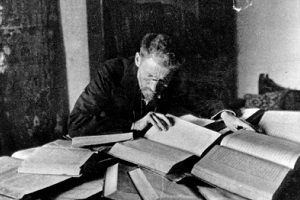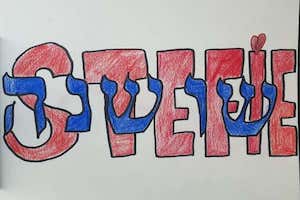Is Learning Hebrew Important?
By Yacov Fruchter
My daughter is two and I’m messing her up.
She lights Shabbat candles, waits all week to eat Challah and drink grape juice out of her Kiddush cup, sings the popular Debbie Friedman Havdalah tune with her grandparents on Skype and says Mode Ani each morning when she wakes up. “Jewishly” connected? I think so – to the extent that a two-year-old can be, and yet I know that something fundamentally important is lacking.

Jewish practice and tradition is well integrated into her life and I’m proud of the Jewish choices we have made for her thus far. Except for one, that is: in April we will be going to Israel for the first time and my failings as a father will be evident to our entire family. Among all of her cousins, and likely everyone else who will be attending my sister’s wedding, Sheelo will be the only person in the room who does not speak Hebrew.
While I take comfort in the fact that it’s not too late, and I recognize that I might be stating my case in an over dramatic fashion, I don’t think the issue of teaching our children to speak and – just as important, if not more so – to comprehend written Hebrew is something that we should be taking lightly.
I also realize, while that living in Canada, learning Hebrew might not seem too important, especially in comparison to the many other skills – Jewish and general – that we want to offer our children. There is no shortage of research on the value of bilingualism but, in Canada, it is easy to make the case for why French should be prioritized over Hebrew.

Copyright © eTeacher Hebrew
At first, I was pretty surprised to say the least when a friend and occasional Annex Shul participant mentioned to me that his five-year-old was learning Mandarin. Upon further reflection, I realized that deciding which languages to teach our children is the perfect Jewish dilemma of the 21st century.
As a Jewish parent what should be my priority? Does a forward-thinking, business-minded Jew ensure that her child learns Hebrew, the language of the Jewish people, the Torah and modern-day Israel, or Mandarin, the language of future financial and business success? Could there be a more quintessential Jewish dilemma – financial stability vs. Jewish heritage?
On the surface, I understand my friend’s decision but, deep down, I know that not teaching our children Hebrew is both a symptom of our increasingly assimilated Jewish community and a major contributing factor in the decreasing connection that young Jews feel towards the Jewish people.

I believe this mainly plays out in two ways. First, leading scholar in Jewish education Professor Barry Chazan argued, in a 2004 article for Agenda: Jewish Education / JESNA, that one of the three reasons that Jewish Americans are becoming less connected to the State of Israel is because teaching Hebrew has become less of a priority in Jewish education.
Second, one can never be truly “Jewishly” literate without being able to access Jewish texts in their original language. When I read the words of the Torah or the greatest Jewish scholars, I am transported to a different plane.
Even the best English translations of the most important Jewish works do little justice to the beauty and richness of the original. When I read the words spoken by Moshe, or the commentaries on them in Rashi’s funny Hebrew letters, it’s as if I am sitting in their Beit Midrash learning directly from the source.
So is learning Hebrew important? Only if you want a deep connection to our shared Jewish history and land. And, just as I know that it’s not too late for my two-year old to learn Hebrew, neither is it too late for the 22- or 72-year-old who might be reading this article.

If you need some help, send me an email sometime and I’ll take some time from learning Mandarin to help you start the process. It’s just too important for the future of the Jewish people not to.
Yacov Fruchter is the Spiritual Leader of the Annex Shul in Toronto.
Click here for the original article.
What's YOUR favorite Hebrew expression?








